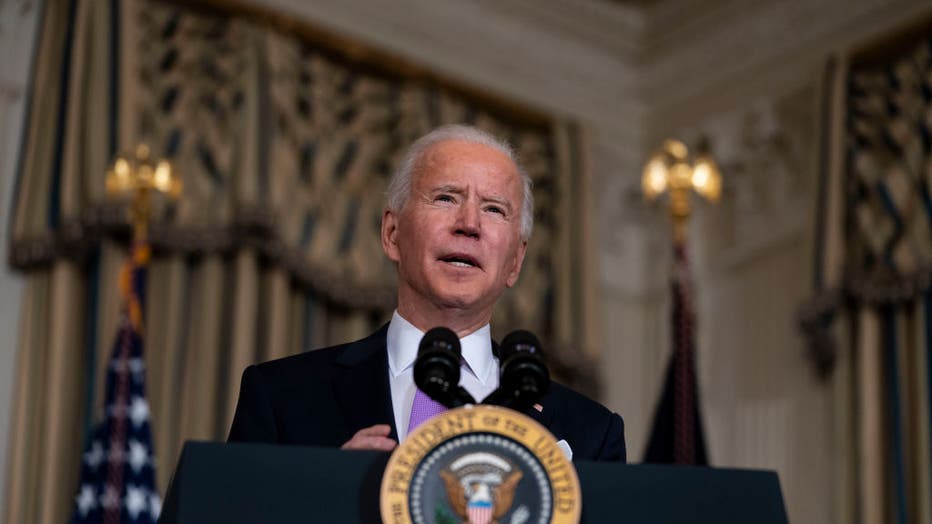Biden opens sign-up window for health coverage to uninsured amid COVID-19 pandemic
WASHINGTON - President Joe Biden on Thursday ordered the HealthCare.gov insurance markets to reopen for a special sign-up period, offering coverage to uninsured Americans as the spread of COVID-19 continues and vaccines are not yet widely available.
Biden signed an executive order directing the HealthCare.gov insurance markets to take new applications for subsidized benefits, something Donald Trump's administration had refused to do. He also instructed his administration to consider reversing other Trump health care policies, including curbs on abortion counseling and the imposition of work requirements for low-income people getting Medicaid.
Before signing the directives in the Oval Office, Biden said he aimed "to undo the damage Trump has done."
"There’s nothing new that we’re doing here other than restoring the Affordable Care Act and restoring Medicaid to the way it was before Trump became president," Biden said, declaring he was reversing "my predecessor’s attack on women’s health."
"Again, I’m not initiating any new law, any new aspects of the law," Biden added. "This is going back to what the situation was prior to (Trump’s) executive order."
Biden has promised to build on former President Barack Obama’s health law to achieve his goal of health insurance coverage for all Americans. While Biden rejects the idea of a government-run system that Sen. Bernie Sanders has pushed for in his "Medicare for All" proposal, his more centrist approach will require congressional buy-in. But opposition to "Obamacare" runs deep among Republicans.
The most concrete short-term impact of Biden's executive orders come from reopening HealthCare.gov insurance markets as coverage has shrunk in the economic turmoil of the COVID-19 outbreak.
The new three-month "special enrollment period" will begin Feb. 15 and run through May 15, according to a White House summary. It will be coupled with a promotional campaign and a call for states that run their own insurance markets to match the federal sign-up opportunity.
Created under the Obama-era Affordable Care Act, the marketplaces offer taxpayer-subsidized coverage regardless of a person’s medical history or preexisting conditions, including COVID-19.
The idea of reopening Obamacare's health insurance markets in the pandemic has had broad support from consumer, medical, and business organizations. The main insurer trade group, America's Health Insurance Plans, applauded Biden's move.

President Joe Biden speaks about his racial equity agenda in the State Dining Room of the White House on Jan. 26, 2021 in Washington, D.C. (Photo by Doug Mills-Pool/Getty Images) (Photo by Doug Mills-Pool/Getty Images)
As the number of uninsured Americans grew because of job losses in the pandemic, the Trump administration resisted calls to reopen HealthCare.gov.
The former president repeatedly vowed to repeal and replace Obamacare, but failed to do so during his tenure. The Trump administration continued trying to find ways to limit the program or unravel it. A Supreme Court decision on Trump’s final legal challenge to the Affordable Care Act is expected by late spring.
RELATED: U.S. Supreme Court likely to leave Affordable Care Act in place
Experts agree that number of uninsured people has risen because of layoffs in the coronavirus economy, but authoritative estimates await government studies due later this year. While some estimates cite 5 million to 10 million newly uninsured people, the nonpartisan Congressional Budget Office says its analysis suggests a smaller number.
Nonetheless, the CBO projects that nearly 32 million Americans are uninsured and of those, about 2 in 3 are eligible for some kind of subsidized coverage.
The Obama-era health care law covers more than 23 million people through a mix of subsidized private insurance sold in all states, and expanded Medicaid adopted by 38 states.
Biden on Thursday also ordered the immediate reversal of a federal policy that bars taxpayer funding for international health care nonprofits that promote or provide abortions. Known as the Mexico City Policy, it has been a political ping-pong ball — bouncing back and forth between Republican and Democratic presidents since it was first enacted in 1985 during former President Ronald Reagan's second term.
Critics of the policy say it hurts women’s reproductive health care and contributes to poverty worldwide. Supporters argue it is essential to preserve the sanctity of life.
Trump had expanded the rule to include nearly all federal health funding, but its effects were felt most abroad, where U.S. assistance can be an essential part of a country's health care spending.
Other directives Biden issued could take months to carry out. Among them, he instructed the Department of Health and Human Services to:
— Consider whether to rescind Trump regulations that bar federally-funded family planning clinics from referring women for abortions. The ban on referrals led to Planned Parenthood clinics leaving the program.
— Reexamine a Trump administration policy that allows states to impose work requirements as a condition for low-income people to get Medicaid health insurance. Work requirements have been blocked by federal judges, and the Supreme Court has agreed to hear the issue.
— Review policies that could undermine protections for people with health problems, such as a Trump administration rule that facilitated the sale of short-term health insurance plans that don't have to cover preexisting medical conditions.
Such changes cannot happen overnight. Rescinding a federal regulation requires a new regulation, which has to follow an established legal process that involves considering different sides of an issue.
Former Trump health policy adviser Brian Blase said the Biden administration has to take care it doesn't throw out some policies intended to help solidly middle-class people who don't qualify for financial assistance under Obama's law.
"Obamacare plans are generally only attractive to people who receive large subsidies to buy them," said Blase. He cited a Trump policy that allows employers to provide tax-free money for workers to buy individual plans.
The Associated Press contributed to this report. It was reported from Cincinnati.

